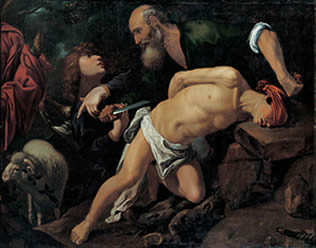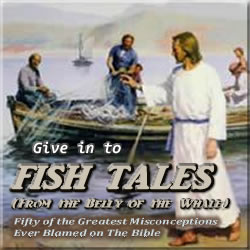Shadow and Substance (Cont’d)
Parallels in Time
Speaking of the role of biblical typology, as long as I can remember, I have been taught that when God asked Abraham to offer his son Isaac as a burnt offering on Mount Moriah, it was supposedly a “type” of God offering up His Son Jesus as a sin offering on Calvary. In this comparison between Abraham and God, and between Isaac and Jesus, I could clearly see a direct correlation in theological terms. What is more, because I already had an appreciation for such cinematic concepts as “foreshadow” and “payoff,” this interpretation of biblical history seemed quite plausible, as though God, the Cosmic Director of the Universe, had planned it so that we could not fail to recognize a connection between the two events. In fact, never once in all my years have I ever felt that such “parallels in time,” so to speak, were not consistent with God’s attempts to convey the truth of His plan of redemption throughout the ages.
To this very point, Cyrus H. Gordon spoke most eloquently:
Scripture makes it quite clear that … Isaac was conceived through divine agency. Like the Mycenaean Greek heroes, Isaac could claim paternity at two levels; the human and the divine. His human father, through whom he obtained his specific position in his people’s history, was Abraham; but his superhuman quality was derived from the deity that visited Sarah. This is of a piece with the dual paternity of Homeric heroes, who hold the office of their human fathers, but are supernatural because of their divine fathers… It is in every way conceivable that some of the original Isaac Cycle survived to re-echo in Christianity. Jesus derives His human office of Messianic King from Joseph, but His divine quality from His Divine Father. Moreover, the Church tradition that connects the sacrifice of Isaac with the sacrifice of Christ apparently rests on sound exegesis, for the sacrifice of Isaac would have meant not only the sacrifice of Abraham’s son but of God’s.1
Understood in this context, then, it has always made perfect sense to me that if Abraham were the father of faith, one could easily accept the view that Isaac was the son of faith. What I did find confusing, though, was the seemingly incomplete picture that the canonical record seemed to offer in the actions of Isaac in relation to those of Jesus. Let me explain what I mean.
Story Continues Below
Says Richard Price—the founder and CEO of Academia.edu—on his podcast In Depth With Academia:
The Book of Days: In Search of the 5,500-year Prophecy Given to Adam About the Coming of Christ is:
To hear Price’s book review of The Book of Days, CLICK HERE.
To hear Kent, Zen Garcia and S. Douglas Woodward as they continue their discussion concerning the implications of the 5,500-year prophecy spoken of in various apocryphal sources and confirmed via the chronology of The Septuagint, CLICK BELOW.
Story Continues From Above
To begin with, if Isaac is supposed to be a “type” of Christ in this scenario, then why does The Book of Genesis depict him as an ignorant, little boy who has no idea what his father is planning for him? In my view, this could never adequately fulfill the typology of Christ, Whom the Scriptures tell us, repeatedly, was a willing participant in drinking from the cup of suffering prepared by God. “I’m the Good Shepherd,” Jesus said. “The Good Shepherd lays down His life for the sheep. The reason My Father loves Me is because I lay down My life—only to take it up again. No one takes My life, but I willingly offer it on My own.”2 So if I am to believe in the unerring word of God, how can the traditional picture of an ignorant son of Abraham qualify as the devoted Son of God? To me, this has always presented a lingering contradiction, even as I have tried to reconcile this blatant gap in terms of what The Bible is supposedly offering as God’s control over every stream of history. No wonder intelligent people continue to question the teaching of preachers who sanctimoniously offer up the Lord as the Omnipotent Master of the Universe, yet He Himself, it seems, is just as determined as they are to sidestep such nagging inconsistencies in His word.
So imagine my reaction when I came upon the story of Abraham and Isaac in the apocryphal literature. In The Book of Jasher, I had finally come upon a rendering that satisfied my desire to prove that God actually knew what He was doing with Isaac when He set out to prepare humanity to recognize what He would someday accomplish with Jesus at Calvary. In Jasher, we are presented with a picture that adequately fleshes out the idea that not only did Jesus fulfill His destiny as the obedient Son of God, but Isaac also fulfilled his role as a genuine type of Christ when he made that fateful journey to Mount Moriah with his father.
But before we look at the scenario presented in Jasher, let us take a moment to examine what would be required of Isaac to ensure that he might truly be called a type of Christ. First of all, unlike the canonical record implies, Isaac could not have been a mere child who was not yet old enough to act on his own accord. If Isaac had been a child, then he still would have been under the jurisdiction of Abraham, and any action performed by Isaac, the boy, could not rightly be compared to those being performed by Jesus, the adult. Furthermore, Isaac would have to know why he was going to Mount Moriah with his father. He would have to fully appreciate the fact that he was going to be killed and presented as a burnt offering to the Lord. And above all, he would have to willingly consent to the wishes of Abraham in what was being done to him. Without any one of these necessary components, the idea that Isaac represents a type of Christ is simply not consistent with any form of logic that I am aware of; and anyone who says otherwise is either stubbornly ignorant, or worse still, downright hypocritical. But fear not, God is quite capable of making sure that all the streams of history conform to His will, because as the story is revealed in Jasher, all these criteria have been adequately met. Let us see for ourselves, then, how all these elements come together in Jasher’s depiction of the drama of Isaac as it pertains to Abraham’s most important mission to Moriah.
When Isaac was thirty-seven years old, Ishmael was visiting him in his tent.
“I was thirteen,” said Ishmael to Isaac, “when the Lord told Father to circumcise us. I gave my life to Him, and since then I’ve never disobeyed.”
“Why brag to me about something like that?” asked Isaac. “You cut off a piece of your skin because the Lord told you to. As the God of Abraham lives, if He told Father to cut me into pieces and burn me as an offering, I wouldn’t hesitate. I’d gladly consent.”
And when the Lord heard what Isaac said to Ishmael, He decided that it would be exactly how He would test Abraham.3
The first thing that one cannot help but notice in this account is that according to Jasher, Isaac was not a mere child as the canonical record implies. He was actually thirty-seven years old. So why would Genesis describe Isaac as a lad? The word lad denotes a child, not a thirty-seven year old man. Why the discrepancy, then? Did Moses make a mental error when he penned Genesis? The discrepancy lies, I believe, in the simple fact that when Moses wrote his version of the story, he knew full well that human beings lived much longer in those days. Based on the apocryphal record, when Abraham was eighty-seven years old, his great-great-grandfather Reu, the son of Peleg, died at the age of two hundred and thirty-nine.4 And when Isaac was one hundred and ten years old, Shem, the son of Noah, died at the ripe old age of six hundred.5 These numbers are also borne out by the canonical record, so by no means was Moses making a mental error when he described Isaac as a mere lad; he was simply describing the situation based on his understanding of the life spans of that era.
In retrospect, the discrepancy lies not in the numbers given to us by Moses but in the fact that we all judge things in relation to our own particular frame of reference. And when this reality, which was simply taken for granted by the biblical authors, is accounted for, it seems quite natural that Moses would call Isaac a lad, even though we moderns would never describe a thirty-seven-year-old man in that way. With this in mind, then, one can easily see that Isaac was, in reality, an adult, and as such can now be considered responsible for any of his own decisions, just as any normal adult might be.








